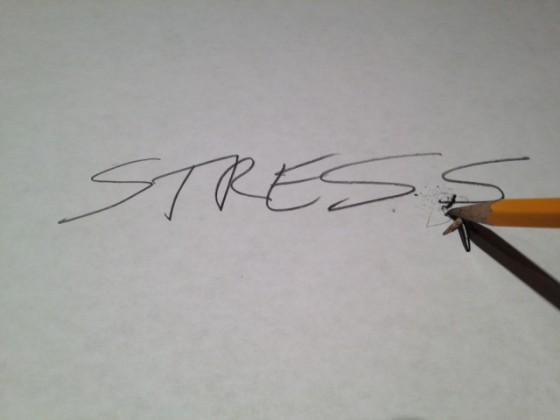
This is a guest post by Joyce Del Rosario
Work and stress – the two seem to go together whether we like it or not. Although some jobs are more stressful than others, everyone experiences work related stress at some point in their lives, which means that the ability to cope with and manage it is essential.
Initially, stress tends to manifest itself in small, almost unnoticeable ways; maybe you’ll have difficulty falling asleep at night or experience headaches more frequently than usual. When left unchecked, stress can quickly spiral out of control and make your life a living hell.
I learned this the hard way after I suffered a near nervous breakdown and was forced to stop working for a few months.
It had gotten to the point where I was suffering from intense migraines almost every day. Just the thought of heading to work in the morning would have me breaking out into a nervous sweat, and even simple non-work related decisions like what to have for dinner seemed overwhelming.
I became depressed and irritable, which caused my personal life to suffer – my stress had begun to control me, instead of the other way around.
I have since learned the importance of managing workplace stress, because although it is an inevitable part of our working lives, it is possible to control it. At the end of the day, it all boils down to a number of simple things that can help us to manage stress levels healthfully, without the help of drugs or therapy.
As simple as these solutions may be, we all need a little reminder every now and then, so I thought I’d share my six rules for staying sane at work and maintaining a healthy work-life balance.
1. Leave work at work
With technology making it possible for us to stay connected wherever we are, it can be difficult to really step out of “work mode” when you get home at the end of the day.
I have learned that it is very important to draw a clear line between working hours and personal time. If the two overlap, or mingle too much, you are leaving yourself open to unnecessary stress.
Make a conscious effort to leave work problems and thoughts at work. Don’t check your email constantly. Let colleagues, clients and bosses know that you are unreachable once you go home.
If you work from home, this can be a little bit more difficult, but setting aside specific hours for work and having a designated office or at least “work corner” helps you to separate work from personal life.
2. Deal with stressful issues as soon as possible
If something work-related is stressing you out, it is important to deal with it as soon as possible to prevent it from escalating. If there is an issue with a colleague, try to get together and talk it out before it starts affecting your quality of work. If an upcoming meeting or deadline is worrying you, identify the reason and then work towards coming up with a solution.
3. Prioritize your tasks
Make a list of everything you need to get done, and then number them in order of importance so that you can start working on the most important or most time-consuming things first and have a clear picture of what you should be focusing on.
Whether you do this on a daily, weekly or monthly basis doesn’t matter; what matters is that you are able to focus on doing one thing at a time, rather than worrying about everything and getting very little actual work done.
4. Identify your stress triggers
We all have stress triggers, and what may not seem stressful to one person can be extremely trying to another. By identifying what is triggering your stress, you can find ways to relieve the stress and eliminate it altogether in some cases.
Maybe getting to work in the morning triggers your stress because you are often late or have to sit in traffic for a long time, in which case you could plan to leave earlier or practice some stress-relieving techniques while waiting, such as deep breathing and listening to calming music.
If deadlines stress you out, make a clear plan and arrange your time carefully to avoid a last-minute rush.
5. Don’t skip your workout
Strenuous physical activity is the best stress-reliever there is. Exercising takes your mind off work and causes the brain to release mood-improving chemicals that combat depression. It’s also a great way to get rid of any pent up frustration from the day and leaves you feeling energized.
It’s tempting to skip workouts when you are feeling tired or stressed, but skipping your exercise will cause you to feel worse than ever, especially if you are skipping it in the hopes of getting more work done.
6. Take a time out
If things are getting to you and you are feeling overwhelmed, step away from the problem for a minute and clear your mind. Take a walk outside or do some stretching and controlled breathing exercises.
Resist the temptation to skip breaks when you are under pressure, because regular breaks can help your mind to focus and will actually help you to get more done in the long run.
What are your experiences? Join the conversation with your comments…
Joyce Del Rosario is part of the team behind Open Colleges, one of Australia’s leading providers of OHS courses. When not working, Joyce blogs about health and fitness.
